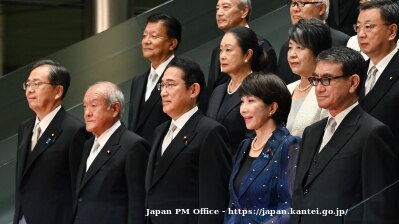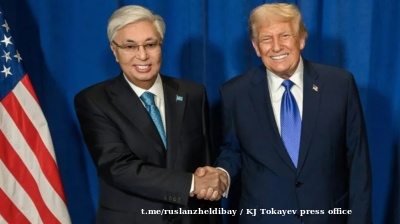After 21 months of bombardment, Gaza's death toll has passed 61,000, with children dying at what UNICEF calls an "unprecedented rate". One hundred and eighty-eight Palestinians have starved to death, 94 of them minors. More than 1,500 have been killed whilst queueing for humanitarian aid.
The International Court of Justice speaks of plausible genocide. The International Criminal Court has issued an arrest warrant for Israel's Prime Minister Benjamin Netanyahu, who now publicly floats plans for a full occupation of the Palestinian enclave.
Yet Western capitals remain unmoved, with European nations issuing empty statements of “concern” while maintaining commercial and military ties with Israel and the Trump administration delivering another $12bn in weapons, just as the humanitarian catastrophe deepens.
In stark contrast, the Global South has long decried Israel's actions triggered by Hamas’ October 7, 2023 attacks. But until last month, such condemnation, too, amounted to little more than words.
That changed in Bogotá on July 16. The “Emergency Conference” to halt the genocide in Gaza wrapped up with twelve nations pledging concrete enforcement measures aimed at crippling Israel’s ability to purchase weaponry: arms embargoes, port closures, contract reviews. The message was clear and defiant – the Global South would no longer wait for Western permission to enforce international law.
For Annelle Sheline, a former US State Department official attending the summit, the Bogota declaration represented something more personal: vindication of her decision to resign sixteen months earlier in protest at US complicity in Gaza's destruction.
"This was a real turning point," Sheline tells bne Intellinews from Washington, where she now works at the Quincy Institute for Responsible Statecraft. "The measures announced reflect significant actions." Unlike the empty condemnations that typically emerge from such gatherings, these were enforcement mechanisms with teeth.
Bolivia, Colombia, Cuba, Indonesia, Iraq, Libya, Malaysia, Namibia, Nicaragua, Oman, Saint Vincent and the Grenadines, South Africa, and later Turkey committed to six specific measures: halting arms transfers to Israel, preventing weapons-carrying vessels from docking at their ports, reviewing public contracts with companies supporting the occupation, and pursuing accountability through universal jurisdiction.
Colombian President Gustavo Petro, co-hosting with South Africa under The Hague Group umbrella, declared they had come "to make history". His words carried real weight: "Together, we have begun the work of ending the era of impunity."
The view from inside
Sheline's presence in Bogotá – through her Quincy Institute affiliation but also, she says, "given my role as a former State Department official" – offered a unique vantage point. She had resigned from the Bureau of Democracy, Human Rights and Labor in March 2024, unable to continue what she called complicity in US support for Israeli war crimes.
"When I started to tell colleagues of my decision to step down, the response I heard repeatedly was, 'Please speak for us,'" she recalls. Her high-profile resignation letter, published by CNN, warned presciently of the invasion of Rafah and widening conflict with Lebanon, both of which came to pass within a few months.
Inside the State Department's office dedicated to promoting human rights in the Middle East, the contradictions had become untenable. "Human rights defenders from elsewhere in the region wanted to speak primarily about Gaza," Sheline explains. "There was little we could offer to assuage their alarm, given the clear intention of the US government to continue arming Israel."
The legal mechanisms meant to prevent such situations were systematically overridden. Within the State Department, some efforts were made to try to limit the weapons provided to Israel, but “other than a brief delay of rifles to Israeli settlers, such concerns were repeatedly overruled,” Sheline says
Drawing the line
The Bogotá summit's timing was deliberate. The September 2024 UN General Assembly resolution on Israeli policies in occupied Palestinian territory, supported by 124 countries, had created binding legal obligations with a 12-month deadline. With that deadline approaching next month, these nations decided to enforce those obligations themselves.
"The post-World War Two system was supposed to signal a way forward whereby might would not make right," Sheline observes. "Yet we see the international community tolerating illegal conquest in Israel's nearly 80-year occupation of Palestine."
The summit brought together 26 nations spanning continents, from Indonesia to Ireland, China to Chile, Qatar to Uruguay. However, only twelve signed immediately, a fact Sheline attributes partly to US intimidation. "Trump working on certain tariffs was not ideal for the timing of the meeting," she notes. "There was concern about economic retaliation from the United States."
Remarkably, the conference's composition showed a clear intent to shield the group from charges of hypocrisy. Russia, Iran and other authoritarian regimes were pointedly excluded despite their vocal pro-Palestinian stance, deemed by some as opportunistic anti-Western posturing rather than genuine care for the human tragedy unfolding in Gaza. The result was thus a coalition united not by ideology but by shared frustration with paralysed international institutions.
Saint Vincent's significance
Despite the country’s small size, the inclusion of Saint Vincent and the Grenadines proved particularly meaningful. "As a Caribbean nation, it plays a very powerful role in global shipping and will have the capacity to block arms from going to Israel," Sheline explains. Small nations discovering they can disrupt a superpower's weapons supply chains marks a subtle but profound shift in the global balance of power.
The presence of UN Special Rapporteur Francesca Albanese, sanctioned by Washington for her alleged “political and economic warfare against the United States and Israel,” as US Secretary of State Marco Rubio put it, best embodied this realignment. "She has become such a symbol of standing up despite efforts to silence her," Sheline says. "It was an honour to meet her."
The primacy problem
Despite having a veneer of care for the humanitarian situation in Gaza and the West Bank, the Biden administration delivered $17.9bn in weapons and security assistance to Israel before leaving office, bypassing Congress when necessary. And with Trump's return, even the mere pretence of concern has evaporated. One of his first acts was lifting a handful of largely symbolic sanctions on extremist West Bank settlers, and he has endorsed controversial plans to take over Gaza, expel the Palestinian population and transform the strip into a Mediterranean resort.
"Whatever credibility the United States had as an advocate for human rights has almost entirely vanished," Sheline states flatly. Her recent analysis for the Quincy Institute goes deeper: the US accounts for 42% of global arms exports, with the Middle East as its most important customer since the 1970s.
"As long as maintaining military primacy remains the overarching objective of US foreign policy, the United States will never prioritise the protection of human rights," she argues. Section 502B of the Foreign Assistance Act – prohibiting security assistance to gross human rights violators – "has never been applied" since its passage in 1976.
Even career foreign service officers, she recalls, "found the flagrant disregard for the law difficult to reconcile with oaths taken to uphold the Constitution."
Momentum building
The Bogota summit set a September 20 deadline for additional nations to join, coinciding with the UN General Assembly and the one-year mark since the binding resolution. Brazil's recent decision to join South Africa's genocide case at the International Court of Justice, "an even bolder move than signing the agenda," according to Sheline, suggests momentum continues despite Trump’s tariff threats.
Additionally, several European nations attended, including Spain, Norway and Portugal, alongside Ireland, indicating this is not simply Cold War-era “South-South cooperation redux” or another iteration of the BRICS-led multipolar world order. Mexico, Brazil and Chile attended but did not immediately sign, though their future participation remains possible.
"I think initially there may have been some hope given statements these governments have made in the past," Sheline notes. But the stringent nature of the measures—far beyond typical diplomatic statements—may have given some governments pause.
Beyond Gaza
The conference's culmination in a mass mobilisation at Plaza Bolívar – named for Simón Bolívar, who dreamed of Latin American independence from imperial domination – provided a fitting metaphor for what these nations are attempting.
"While we may face threats of retaliation when we stand up for international law," President Petro warned, "the consequences of abdicating our responsibilities will be dire. If we fail to act now, we not only betray the Palestinian people; we become complicit in the atrocities committed by Netanyahu's government."
For those still inside the US State Department, the colleagues who asked Sheline to speak out for them, the situation has only deteriorated under Trump, who has made no secret of his intentions to abolish aid and multilateral programmes under the guise of cost-cutting measures. "They're trying to get rid of everyone in government anyway," she observes. "If anyone resigns, they see it as one less salary they need to pay."
Yet she suggests Trump's brazenness might paradoxically strengthen the US human rights movement. "Someone like Trump, who brazenly does not give a damn about human rights, is a more unifying figure for human rights organisations to stand up against."
A new order?
The Bogotá conference may be remembered as the moment the Global South defied the established, dysfunctional order and took matters into its own hands. "These countries are simply affirming international law," Sheline says, "but I do wonder how long they will be willing to continue to participate in a broken international system."
The Hague Group, formed in January 2025, has moved beyond diplomatic statements to concrete action. South Africa's 2023 genocide case against Israel, joined by Bolivia, Colombia, Namibia and now Brazil, displays a legal audacity that would have been unthinkable without superpower backing just years ago.
"The myth that American primacy upholds human rights lies buried beneath the rubble of Gaza," Sheline concludes in her analysis. After decades of instrumentalised human rights concerns "selectively invoked when they do not threaten the military-industrial complex,” such as in the case of the Ukraine conflict, the contradiction has become impossible to ignore.
When small Caribbean nations can block arms shipments and middle powers can prosecute genocide cases without Western backing, the post-1945 order reveals its obsolescence. The precedent set in Bogotá suggests developing nations will no longer accept relegation to the margins of international decision-making, whether on climate change, trade disputes, or humanitarian crises.
The question is not whether this represents true multipolarity – it clearly does – but whether the Global South will now construct its own architecture entirely, leaving Washington, self-stripped of its "world's policeman" mantle, to preside over an increasingly irrelevant order.
Features

Japan’s new ‘Iron Lady’ Sanae Takaichi – a win for Taiwan, a slap in the face for China
Galling to China, Takaichi is said to be a regular visitor to Yasukuni Shrine, which, given its enshrinement of Japan’s war dead, including a number of convicted war criminals, is seen as a political slap in the face by Beijing.

Malaysia’s fuel recalibration: balancing fiscal discipline and public relief
In late September 2025, the Malaysian government unveiled a recalibrated approach to its long-running petrol subsidy, lowering the price of RON95 for citizens to $0.47 per litre.

Did Tokayev’s visit to New York indicate any meaningful expansion of Kazakh-American economic ties?
Best not believe the hype.

Water scarcity forces a rethink of Tehran's dominance
Iran is fast running out of water fast and the country's president wants to move the capital immediately.


_1759848608.jpeg)

_Cropped_1759755381.jpg)